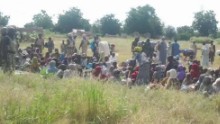Cameroon: At least 6 killed in suspected Boko Haram suicide bombings
Four suicide bombers blew themselves up in a northern Cameroonian town near the Nigerian border Saturday, killing at least six people and injuring about 12 others, a Cameroonian military spokesman said.
The Nigeria-based terror group Boko Haram is suspected to have been behind the attack in the town of Fotokol, Cameroon army Maj. Nlate Ebale said.
Boko Haram has increasingly asserted itself, not only in its home base in Nigeria, but also in other western and central African countries, including Cameroon, Niger, Benin and Chad.
Fotokol in particular has been a frequent target. In January, Boko Haram militants slaughtered more than 400 people in door-to-door gun and knife attacks in the town, residents said.
The attacks have happened despite a multinational military force of 8,700 people set up to fight the insurgents. Boko Haram attacks in Nigeria, Cameroon, Chad and Niger had claimed the lives of at least 3,500 people from January to September, according to Amnesty International.
The Global Terrorism Index, an annual report by the New York City-based Institute for Economics and Peace, said Boko Haram killed 6,644 people in terror attacks during 2014, more than ISIS, blamed for 6,073.
Boko Haram aims to institute Sharia, or Islamic law. It has carried out a campaign of terror in northern Nigeria, killing thousands, taking hundreds captive, and occupying swaths of territory in Borno state.
It has perpetrated bombings of marketplaces, churches, mosques and other public gathering spots. Kidnappings are one of the group's hallmarks, the most notorious coming last year when it abducted more than 200 girls from a school in the northeastern Nigerian city of Chibok.
Those girls' fates remain a mystery.
The group's recruiting efforts have benefited from poverty in both northern Nigeria and northern Cameroon.
"There is no doubt that youths in Cameroon's Far North region are joining Boko Haram," said Col. Joseph Nouma, head of Cameroon's elite forces specialized in fighting terrorism.
Joseph Vincent Ntuda Ebode, a geopolitics professor at the University of Yaounde, said nations will not defeat Boko Haram with weapons alone.
"Of course, a military response is necessary. But the war must go beyond that," he said. "We need to address the problem of poverty and unemployment plaguing these regions (where Boko Haram is active) to dissuade the youths from joining the terrorists."
News Courtesy: www.cnn.com











